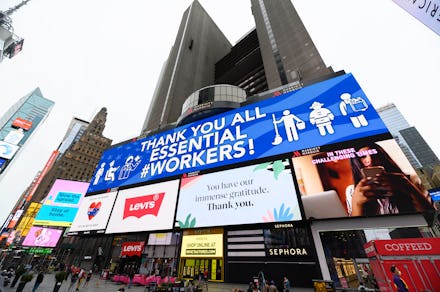Who's winning Americans' trust during the coronavirus pandemic?

Americans now spend their days grappling with the harrowing effects of coronavirus. Beyond concern for personal safety and the health of their communities, at the time of publication, more than 41,000 Americans have lost their lives and 22 million Americans have filed jobless claims since stay-at-home orders came into effect. That means that 1 in every 10 Americans has lost their job due to the effects of COVID-19, and over 50% of Americans under the age of 45 report that they have lost their job, had hours reduced, or gotten furloughed.
Anxiety is running high. The Bustle Trends Group surveyed over 500 of our readers in early April and found that the top three adjectives they’re using to describe how they’re feeling are anxious (62%), uncertain (52%), and stressed (43%).
At low points like this, Americans are looking for someone or something to trust that will see us through this. To better understand who Americans trust to lead during this difficult time, the Bustle Trends Group surveyed 2,000 Americans ages 14-49 in collaboration with the insights platform Pollfish. The survey was conducted March 21–23.
Our results mirror the national conversation about competent state and local management of the coronavirus pandemic. We found that trust in local government has grown the most of any category, with 47% saying they trust local government either a little or a lot more than when the coronavirus crisis began. This is followed by the federal government with a 40% uptick, and their current employer or school with a 40% bump as well.
In terms of trust levels overall, we asked respondents how much they trust a wide range of institutions. Their answers were surprising. Current employers and schools garnered the highest level of trust with over 82% of respondents reporting that they trusted them a lot or somewhat. Gyms and mass retailers came in at nearly 80%.
As we tackle how — and when — to reopen the economy and begin to see what form American life will take, there is perhaps no topic more critical than trust.
An important storyline throughout this entire crisis has been the low level of trust Americans have in the media. Our survey found that the media was trusted the least of any institution, with only 53% of respondents saying they trust the media a lot or somewhat. People have also lost the most trust in the media out of any institution we asked about, with 34% saying their trust in the media has declined during the pandemic.
This is a particularly dangerous reality at a time when it is absolutely necessary that Americans trust the media to relay accurate health information. While we may all be home during the day, we are by and large still working or attending classes. The media plays a vital role in distilling information from politicians, policy experts, and medical professionals. If Americans do not trust the job the media is doing, it’s virtually guaranteed that they’re missing out on important information.
We also dug into how Americans view companies and brands during this tumultuous time. We have taken note of the actions some companies have taken, from producing masks and hand sanitizer to offering free flights for health care workers to feeding the unemployed and first responders. Americans are paying attention, too. Our survey found that companies providing paid leave are benefitting from the greatest increase in trust, followed by those that are supporting vulnerable communities. On the other side of the equation, companies that are laying off employees are at risk of losing the most trust, even if consumers understand that this may be a necessary action.
There were also some notable gender-based and generational patterns in terms of a person’s perception of a brand or company based on actions they’ve taken during the pandemic. Trust amongst female respondents was more likely to increase than among male respondents, and millennials were more easily swayed than zoomers.
The months ahead will be difficult as we continue to adjust to our “new normal.” As we tackle how — and when — to reopen the economy and begin to see what form American life will take, there is perhaps no topic more critical than trust. Faith in institutions will make a tremendous difference in which politicians, brands, and companies survive this pandemic.